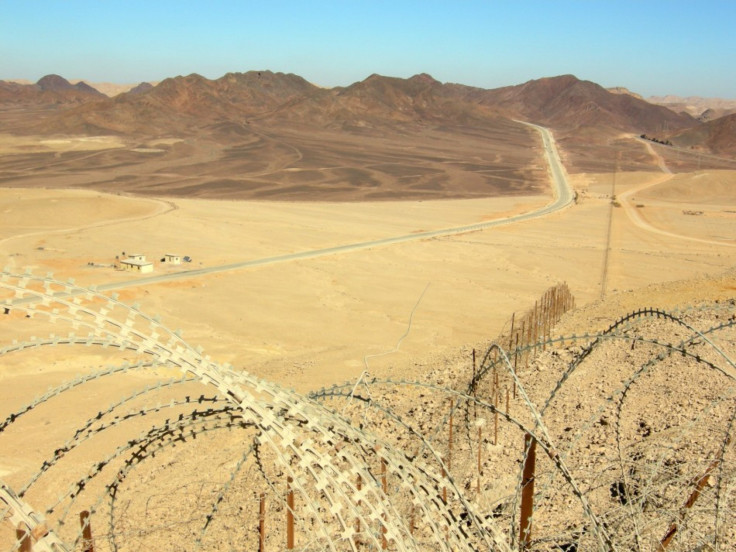Why The Sinai Peninsula Matters: Militants Compromise Security Along Egypt’s Border With Israel
ANALYSIS

A checkpoint on the border between Egypt and Israel was overrun by militants on Sunday, raising concerns about border security in Egypt and threatening Cairo's increasingly tenuous partnership with Tel Aviv.
The militants, who are suspected to be Islamists, killed 16 soldiers when they stormed the checkpoint. They then stole two vehicles and crashed through a security fence, entering Israeli territory. The Associated Press reports that the offensive ended when Israeli airstrikes targeted the vehicles, killing at least eight of the militants.
This is one of the worst incidents of Sinai Peninsula violence in years, and it threatens Cairo's increasingly tenuous partnership with Tel Aviv.
At first glance, the Sinai may seem like an odd nexus for such a major conflict. This connector of continents is isolated and sparsely populated. It is mostly desert and does not boast much in the way of resources -- its main contribution to the Egyptian economy comes from the tourist resorts that line the southern coast, along the Red Sea.
But despite its relative isolation, the Sinai plays a huge role in one of the overarching conflicts of the twentieth century: the Arab-Israeli conflict.
The discord began in 1948, immediately following the establishment of the state of Israel. It began as territorial battle, centered on the displacement of Palestinians. But over the years, the various military clashes between Israel and its neighbors have become part of a single narrative; Israeli and Western initiatives in the Middle East are often seen as threats to Arab sovereignty, and vice-versa.
The year 1978 was a turning point. That's when Egyptian President Anwar Sadat and Israeli Prime Minister Menachem Begin attended a series of hushed meetings on U.S. soil, working to establish a plan for peace. They eventually signed the Camp David Accords, under the auspices of U.S. President Jimmy Carter. In return for agreeing to recognize the state of Israel and normalize relations, Egypt gained the Sinai Peninsula, which Israel had occupied during the Six-Day War of 1967.
The Sinai thereby became a symbol -- either of successful negotiation or of capitulation, depending on your point of view --and it remains a keystone of the uneasy peace agreement between Israel and Egypt.
To the West, the Camp David Accords were seen as a monumental achievement. Sadat and Begin both won the 1978 Nobel Peace Prize, and Egypt became an important ally to the West.
But some Arabs cried foul, arguing that Sadat had surrendered to U.S. and Israeli demands. Egypt was temporarily suspended from the Arab League, and Sadat himself was assassinated by Islamist radicals in 1981. He was succeeded by Hosni Mubarak, who upheld his predecessor's policy of cooperation with the West.
The overthrow of Mubarak was therefore a monumental event not only for Egyptians, but for any global powers interested in maintaining partnerships in the Middle East. The recent ascension of an Islamist candidate -- Muslim Brotherhood member Mohamed Mursi -- to Egypt's top post raises questions as to whether Egypt will maintain its alliance with Israel and the United States.
The soft-spoken Mursi has adopted a moderate tone, vaguely promising to uphold international treaties and protect the rights of non-Muslims in Egypt. But he has also strengthened his country's ties to Hamas, a Palestinian group that is considered a terrorist organization by the United States. Its members control the Gaza Strip, and its militants have launched attacks against the state of Israel.
In short, Mursi walks a fine line. On the one hand are the Egyptian secularists and Western powers who are accustomed to Egypt's polices of Western alignment; on the other hand are Arab sovereignty advocates and Islamist groups who played a major role in helping Mursi to win Egypt's historical June election.
And caught in the middle of it all is the Sinai Peninsula, home to about 360,000 people. It is the only part of Egypt that shares a border with Israel. And since it is somewhat removed from the Egypt's administrative bodies in Cairo, security there is lax and the potential for increased insurgencies is a major cause for concern.
The Sinai has been relatively stable since it was given back to Egypt in 1979, despite sporadic skirmishes and terrorist attacks there. But in the months following the Egyptian revolution, national security has suffered and insurgency movements in the Sinai have increased, spilling into Israel and raising alarms in Tel Aviv. Israel is currently building a steel fence along the border to prevent the influx of dangerous migrants, which is slated for completion in 2012.
Following Sunday's attack, Israeli Defense Minister Ehud Barak called for the Egyptian government to increase its vigilance in the Sinai.
"We hope this will be a fitting wakeup call for the Egyptians to take things in hand on their side more forcefully," he said on Monday, according to the Associated Press.
Egypt has indeed sent in forces of its own, sweeping the Sinai with helicopter gunships in efforts to capture the militants who were not killed following Sunday's attack.
Mursi addressed the nation in a televised statement in Monday morning. "I have given clear orders to all of our security forces, the armed forces as well as the interior police, to move swiftly in capturing those behind this vicious attack," he said, according to Al Jazeera.
"This incident will not go lightly. The security forces will implement entire control over all of these areas within Sinai and will ensure they are controlling it. Those behind the attacks will pay a high price as well as those who have been co-operating with those attackers, be it those inside or anywhere in Egypt."
Israeli officials hope that Mursi lives up to his word. A deterioration of security in the Sinai could have hugely detrimental effects on the relationship between Israel and Egypt, which would in turn increase tensions between Israel and much of the Arab world.
© Copyright IBTimes 2024. All rights reserved.






















